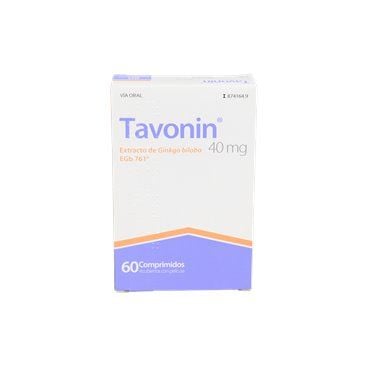Tavonin 40Mg 60 Film-coated Tablets
This medicine is indicated for the symptomatic treatment of alterations in the cerebral microcirculation (such as vertigo and tinnitus) or of symptoms associated with circulatory insufficiency in the extremities (such as cramps and a feeling of cold in the legs).
This medicine is indicated for the symptomatic treatment of alterations in the cerebral microcirculation (such as vertigo and tinnitus) or of symptoms associated with circulatory insufficiency in the extremities (such as cramps and a feeling of cold in the legs).
Tavonin (40 Mg 60 Coated Tablets)
ACTION AND MECHANISM
- Vasodilator. Ginkgo leaves seem to improve cerebral and peripheral blood flow due to possible vasodilator and antiplatelet effects, improving the rheological properties of the blood.
The exact mechanism and the active ingredients responsible are unknown, although it is postulated that they could be flavonoids, such as quercetin, and terpenoids such as ginkgolides and bilobalides.
INDICATIONS
- Symptomatic treatment of mild disorders derived from cerebral circulatory alterations, such as [VERTIGO], [DIZZINESS] or [TINNITUS], or of the lower extremities such as [MUSCULAR CRAMPS] or [COLD IN THE LIMBS].
POSOLOGY
"TAVONIN DOSAGE"
- Adults:
* Tavonin 40 mg: 1 tablet 3 times a day. If necessary, it can be increased to 1 tablet 4 times a day.
* Tavonin 120 mg: 1 tablet per day. If necessary, it can be increased to 2 tablets per day.
- Children and adolescents <18 years: not recommended.
- Elderly: no specific dosage recommendations have been made.
Duration of treatment : 6-8 weeks.
Missed dose : administer the forgotten dose as soon as possible, unless there is a short time for the next one. Administer the next dose at the usual time. Do not double the next dose.
DOSAGE IN KIDNEY INSUFFICIENCY
No specific dosage recommendations have been made.
DOSAGE IN LIVER INSUFFICIENCY
No specific dosage recommendations have been made.
RULES FOR CORRECT ADMINISTRATION
- Tablets: swallow without chewing with a sufficient amount of liquid. Do not drink lying down.
Administration with food : administer separately from meals.
CONTRAINDICATIONS
- Hypersensitivity to ginkgo or any other component of the drug.
PRECAUTIONS
- [DISORDERS OF COAGULATION]. Ginkgo may increase the risk of bleeding, so caution is advised in patients with bleeding disorders or [BLEEDING].
Stop treatment at least 2 weeks before surgery.
- [EPILEPSY]. It cannot be ruled out that it might increase the risk of [SEIZURES].
PRECAUTIONS RELATING TO EXCIPIENTS
- This medicine contains lactose. Patients with hereditary [LACTOSE INTOLERANCE] or galactose, Lapp's lactase deficiency, or glucose or galactose malabsorption should not take this medicine.
ADVICE TO THE PATIENT
- Warn your doctor and / or pharmacist if:
* Symptoms continue or worsen while using ginkgo.
* You are going to have surgery.
SPECIAL WARNINGS
- Suspend treatment at least 2 weeks before scheduled surgery due to the risk of increased bleeding time.
INTERACTIONS
- Anticoagulants. Ginkgo might increase the risk of bleeding when combined with anticoagulant or antiplatelet drugs.
PREGNANCY
Animal safety : no data available.
Safety in humans : There are no adequate and well-controlled studies in humans. It is recommended to avoid its administration.
Effects on Fertility : No specific studies have been performed in humans.
LACTATION
Animal safety : no data available.
Safety in humans : it is not known if it is excreted with milk, and the consequences it could have for the infant. It is recommended to avoid its administration.
KIDS
Safety and efficacy have not been evaluated in children and adolescents <18 years of age, so it is recommended to avoid its use.
SENIORS
No specific problems have been described in the elderly that require a dosage adjustment.
EFFECTS ON DRIVING
It does not appear to present significant effects.
ADVERSE REACTIONS
Adverse reactions are usually mild and transient.
Adverse reactions are described according to each frequency range, being considered very common (> 10%), common (1-10%), uncommon (0.1-1%), rare (0.01-0.1%) , very rare (<0.01%) or of unknown frequency (cannot be estimated from the available data).
- Immune system disorders: frequency unknown [HYPERSENSITIVITY REACTIONS], with [ERYTHEMA] or [PRURITO].
- Nervous system disorders: frequency unknown [HEADACHE], [DIZZINESS], [VERTIGO].
- Gastrointestinal disorders: frequency unknown [DIARRHEA], [ABDOMINAL PAIN], [NAUSEA].
OVERDOSE
Symptoms : no cases have been described.
Measures to be taken :
- Antidote: there is no specific antidote.
- General disposal measures: have not been described.
- Monitoring: clinical status of the patient.
- Treatment: symptomatic.



